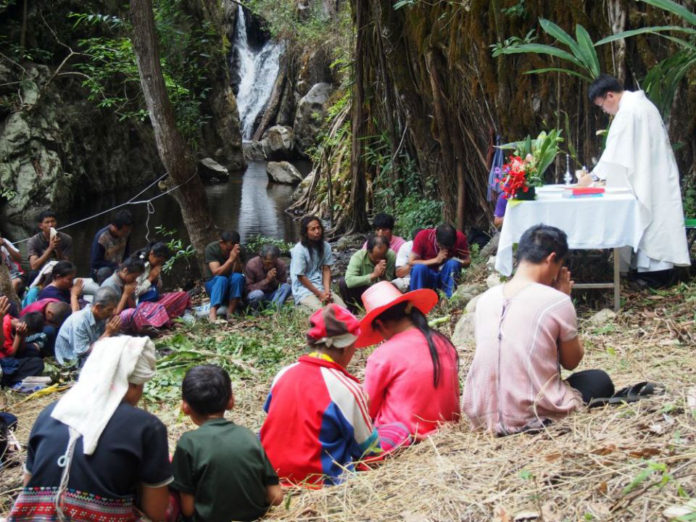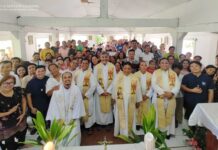
International Hmong Center for Catechists blessed in Chiang Mai
Bishop Francis Xavier Vira Arpondratana of Chiang Mai blessed the new International Hmong Center for the catechists on Saturday, January 14, in Chiang Mai, Thailand.
The new training centre will form Hmong catechists to serve the Hmong people. The Center was sponsored by Hmong communities in Thailand and around the world.

Around five hundred people from Vietnam, Laos, China, Thailand and the US were participated in the event.
The International Hmong Center is a place for the activities of the Hmong community in Thailand and abroad.
Catechist Metha Seansrichophan takes care of the formation center for the new catechists. Three full-time catechists take care of the place during the week and other three join them in the pastoral work during the weekend in the villages.
During the homily, bishop Francis Xavier Vira Arpondratana praised the work of Metha and the other catechists: “what gave you the strength and the perseverance to accomplish this great task was faith and the belief that God called you to accomplish something unique. Now the Hmong people have a great instrument for the new evangelization where the lay people are the real protagonists.”
Six young men live at the Center in order to test their vocation and understand if they are called to be the next Hmong catechist generation, they go to school, receive catholic formation, and join pastoral work in the Hmong villages.
“They are the future, says Metha, we laid the foundations of this new way of evangelization and they now are the one called to fulfill father Harry’s dream, which is the dream of the church: the lay people are not the object of evangelization, they are the main actor of it. They are no more distant professionals of evangelization, but people who share in the same way of life as others, experience the same challenges
The Hmong population is over 4 million people around the world, mostly settled in the mountainous area of South-East Asia. Around 300,000 Hmongs moved to the US for historical reasons.
The Hmong tribes are proud of their specific culture and tradition and speak the same language wherever they are.
The evangelization of the Hmong people is a recent enterprise since the Hmong tribes live in very remote areas and their culture is quite resistant to foreign values and culture of the church.
Father Harry Thiel, one of the first Redemptorist missionaries that worked with the Hmong tribes in Thailand, realized that it was almost impossible to have Hmong priests to serve the Hmong people because the families would not allow the young men to leave their homes and neglect the duty toward the parents.
At that time the word inculturation was not at the center of catholic theological reflection, but it was clear to him that the Hmong people could not accept a “foreign” faith not related to their life style, culture, and tradition.
Father Harry found a way out of this deadlock moving the center of gravity of evangelization from the priests to the catechists: “the Hmong church, used to say father Harry, has to grow thanks to a network of formed and capable catechists who get married, don’t leave their families and proclaim the Gospel to people that they know well.”
The experience of Metha Seansrichophan confirms father Harry’s intuitions.
Metha wanted to become a priest, but the family did not allow him to go to the seminary neither when he was a young boy nor when he became an adult.
He pursued his dream of becoming a missionary choosing to be a catechist. Metha became his close collaborator and worked in the Hmong villages teaching catechism, administering certain sacraments, and helping the people in need.
Metha is also teaching Hmong communities in Vietnam, Laos, and China and now takes care of the international centre.
Metha was not alone since Father Harry had founded a Hmong Center where the catechists could stay for their formation and live as a community in order to experience the values of the Gospel, interiorize them and bring them to the Hmong communities.
“Some of us, said Metha, who lived at the center and we experienced a family atmosphere and great enthusiasm. The priest was a central figure, but he could not be as present as we were. The Hmong people saw us as members of their family and welcomed us. They listened to us, and asked for baptism. That period was a blessing for us and for the Hmong people.”
Father Harry Thiel died in 2006, but his legacy remained in this group of catechists. Formed by him, Father Harry’s dream became Metha’s heritage:
“My dream, continued Metha, was to build an International Hmong Center run by lay Hmong catechists, able to form young Hmong men from different nations and send them to Hmong areas to bring the Gospel in an enculturated way.”
Metha met the right people at the right time. In one of his trips to the US he shared his dream with a permanent deacon who helped him to find funds to buy the land and start the construction. In 2017 Metha, together with a few other catechists and friends, started to prepare the land, to refine the layout of the constructions, and finally, in 2023, they could bless the new building.
During the homily, bishop Francis Xavier Vira Arpondratana praised the work of Metha and the other catechists: “what gave you the strength and the perseverance to accomplish this great task was faith and the belief that God called you to accomplish something unique. Now the Hmong people have a great instrument for the new evangelization where the lay people are the real protagonists”.
The International Hmong Center is a place for the activities of the Hmong community in Thailand and abroad. Three full-time catechists take care of the place during the week and other three join them in the pastoral work during the weekend in the villages.
Metha was also asked to lecture Hmong communities in Vietnam, Laos, and China and now is the one who takes care of the formation center for the new catechists. Six young men live at the Center in order to test their vocation and understand if they are called to be the next Hmong catechist generation, they go to school, receive catholic formation and join pastoral work in the Hmong villages.
“They are the future -said Metha- we laid the foundations of this new way of evangelization and they now are the one called to fulfill father Harry’s dream, which is the dream of the church: the lay people are not the object of evangelization, they are the main actor of it. They are no more distant professionals of evangelization, but people who share in the same way of life as others, experience the same challenges and joys and for this reason, they understand the normal people better and can preach Jesus’ message more effectively”.
The International Hmong Center is under the supervision of the bishop and the diocese provides for the catechist’s stipend, but, at the same time, the catechists are free to experiment new ways of evangelization.
-Domenico Rodighiero –
International Hmong Center for Catechists blessed in Chiang Mai
Radio Veritas Asia
You can also read: A Hmong priest from Thailand missionary in the US.






